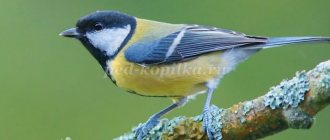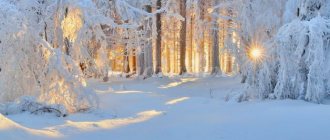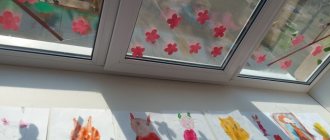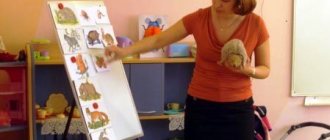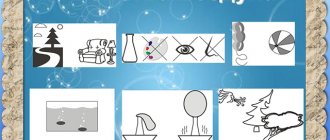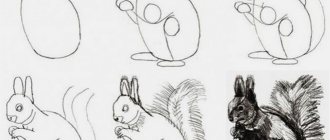Abstract of the GCD on the topic “Birds are our friends.” Senior group
GCD in the senior group “Birds are our friends”
GOAL: to identify children’s knowledge about birds. Instill a love for nature and cultivate a caring attitude towards it. OBJECTIVES :: generalize children’s knowledge about wintering and migratory birds; teach logically, think, cultivate interest in the inhabitants of nature, the ability to sympathize, empathize with wintering birds, take care of birds - feed them. PRELIMINARY WORK: examination of illustrations;
reading books and stories; asking riddles; observations; conversations; bird drawing, applique, modeling. Progress of the lesson:
Educator: Guys, we have a very interesting lesson today. Say: Sparrows, swifts, penguins, bullfinches, rooks, peacocks, parrots and tits: in one word this is -. (BIRDS) Educator: That's right guys, today we will talk about birds. What birds do you know? What do we call the birds that winter with us? What are the names of the birds that come to us in the spring? How do migratory birds know when it's time to leave? (children express their guesses). Why do you think birds fly away to warmer climes? (children’s statements) Educator: Now stand in a circle and let’s play. The game is called "Migratory - Wintering". I will throw a ball to you and name the bird, and you will say whether it is a migratory bird or a wintering bird. (a game is being played). Educator: What time of year is it now? Children: Winter - How do birds live in winter? Children: Hungry birds, insects in hibernation, fruits, berries, grass seeds under the snow. Birds find little food in winter. From morning to evening they look for crumbs of food. Birds' downy, warm, feather coats protect them from cold, but not from hunger Educator : In harsh years, out of ten tits, only one survives during the winter. Nine die of starvation. - It's a pity? Children: very sorry Teacher: - Listen to N. Gribchev’s poem. Well, it’s frosty, well, it’s frosty, Nose out - oh-oh-oh! Even white birches have an icy gray crust. Even squirrels are restless Waiting for warmth They don’t scurry off the branch onto a branch, They don’t climb out of the warmth And a hungry tit quietly cries at the window: “There’s nowhere to warm up and feed, No boogers, no grain. The day smokes in the frosty distance, The nights are cold and dark, I’m freezing, I’m starving, “I won’t live to see spring!” - Guys, who can help the wintering birds? (people) Educator: How can people help the birds? (make feeders, feed the birds.) Educator: You can offer the titmouse a piece of unsalted lard; sparrows, bullfinches - bread crumbs, seeds, cereals, grains. And also, in order to feed the birds, you must follow some rules: 1. The birds must be fed in the same place, preferably at the same time. 2. Birds must be fed daily; You can’t feed it from time to time! Especially in cold weather, birds need food every day in order for them to survive. 3. When feeding, do not litter, pick up trash after yourself. Educator:: Birds protect forests and fields from pests, insects, and birds also predict the weather. There are some folk signs: – If sparrows bathe in water in cold weather, it means warmth; – Bullfinches are chirping under the windows – there will be a thaw; – Tits have moved to a person’s home – the beginning of winter, winter will be snowy and cold.. Tell your moms and dads about the signs. Ask your parents what folk signs about birds they know. Educator: Guys, let's imagine that we are birds . Physical education. It's morning! Stop sleeping! Before you fly, you need to stretch your wings. Up wing, down wing, And now it’s the other way around! (One straight arm is raised, the other is lowered, the arms change with a jerk.) We spread the wings to the sides, and bring the shoulder blades together. (Hands in front of the chest, jerking your arms to the sides.) Bend right and left, And bend back and forth. (Tilts left-right, forward-backward.) On command we squat - One-two-three-four-five. Let's do the exercise. Chur, friends, don't lag behind! (Squats.) Wings to the sides and fly. Educator: you’ve had a rest, now guess the riddles? Who looks at the sidewalk and shouts to us from a branch: “Karr!”? Chop a piece of loaf - It will fly in to eat... (crow) They flew in in a flock of loud birds with a bright red breast. Look outside the window - There on the branches... (bullfinches) Who flaunts on the branch In a yellow festive vest? This little bird And her name is... (titmouse) What kind of bird on the bough In the grove sings: “Ku-ku”? An inconspicuous pestle, And her name is... (cuckoo) Guess what kind of bird: At night she can’t sleep at all, The grass won’t help her sleep, She only falls asleep during the day... (owl) Educator Guys, birds are our friends, we can’t offend them. Tell me, what benefits do birds bring? (children's answers) Educator: How can we help birds in winter? (make a feeder) That's right, you can make feeders. Homework assignment. Make a feeder at home with your parents and bring it to kindergarten. Lesson summary: Birds are our faithful helpers, protectors of our forests, fields, gardens, vegetable gardens from harmful insects and rodents. We can't do without birds.
We recommend watching:
Summary of GCD for introducing older preschoolers to the work of the poet Fet Summary of plot-based GCD in physical education for children of the senior group Summary of GCD in the senior group of compensatory orientation GCD in kindergarten for older preschoolers
Similar articles:
Summary of GCD in the senior group on the topic “Communication”
Summary of GCD in the senior group of kindergarten on the topic “Relaxation”
Summary of a lesson on cognition in the senior group on the topic “Dairy products”
Summary of a lesson on cognition in the senior group on the topic “Construction professions”
Abstract of educational activities for cognition in the senior group of kindergarten on the topic “Russian folk crafts”
Lesson summary for the senior group on the topic: Birds
Lesson notes. Topic: “Let's talk about birds”
The summary is intended for preschool teachers.
Objectives of the lesson: • deepen and expand children's knowledge about birds; • explain the reason for bird migration; • learn to distinguish birds from other animals; • enrich and activate children's speech; • Cultivate a kind, caring attitude towards feathered friends, a desire to help birds during a difficult period for them. Preliminary work: • bird watching on a walk;
• looking at illustrations with birds; • learning the outdoor game “Birder Catcher”; • asking riddles • reading fiction about birds. Progress of the lesson:
- Guys, guess who we will talk about today in class.
Riddle: “We differ in color, you will meet us in winter and summer. If we flap our wings, we will be in the blue sky. We can chirp, croak, sing and coo. You will feed us in winter. Children, who are we? name it." (birds) - What birds do you know? (children take turns naming one bird at a time) - Well done, you know a lot of birds. This means that it will not be difficult for you to guess my riddles. 1. How would a crown suit me? — The Crow croaked importantly 2. Who, without notes and without a pipe, is the best at trilling, more vocal, more tender? Who is this? (Nightingale) 3. If it wants, it will fly straight, If it wants, it hangs in the air, it falls like a stone from the heights, and in the fields it sings and sings. (Lark) 4. It flies all night - it gets mice. And it becomes light - Sleep flies into the hollow. (Owl). 5. If I knock, my head hurts, but if I don’t knock, I’m hungry. (Woodpecker). 6. Lives in the forest, Howls like a robber, People are afraid of him, And he is afraid of people. (Owl). 7. He knocks all the time, he hammers trees, but he doesn’t cripple them, he only heals them. (Woodpecker) 8. A spotted bird laid an egg in someone else’s nest. (Cuckoo). 9. In the summer they follow the plowman, but in the winter they leave screaming. (Rooks). 10. Stands on one leg, looks intently into the water. Poking at random with its beak - Looking for frogs in the river. A drop hung on my nose. Do you recognize? This is... (Heron). 11. And he doesn’t sing, And he doesn’t fly, Why then do they consider Him a bird? (Ostrich). 12. Who, without notes and without a pipe, plays trills best, more vocally, more tenderly? Who is this?.. (Nightingale). 13. The motley fidget, the long-tailed bird, the talkative bird, the most talkative. (Magpie) - What will happen if we don’t have birds? (children’s answers) - What can we do to prevent birds from disappearing? How can we help them? (build birdhouses, make feeders, etc.) So that flowering gardens do not die in vain from harmful insects. Always, at any time of the year. Take care of all kinds of birds, friends. — With the onset of cold weather in the fall, the migration of birds begins, this is how it is written in E. Blaginina’s poem: Soon white snowstorms will raise the snow from the ground. The cranes are flying away, flying away, flying away. You can’t hear the cuckoo in the grove, And the birdhouse is empty, The stork flaps its wings - It flies away, it flies away. A patterned leaf sways in a blue puddle on the water. A black rook and a black rook are walking in the garden, along the ridge. The rare rays of the sun, crumbling and turning yellow, The rooks are flying away, flying away, flying away. — Guys, what birds is this poem about? (about migratory birds) - The first to fly away from us are the fast-winged birds. These are swifts, swallows, starlings, larks. They fly away at the end of August, because... many insects disappear. These birds feed on insects and are called insectivores. — On the golden autumn days, the cranes gathered to fly away. They circled over their native swamp, gathered in schools, and headed to distant warm countries. The strongest one flies ahead - the leader. Wild geese and ducks fly away later than everyone else - when rivers and lakes freeze. These birds are called waterfowl. - Let's try to fly like the birds Fizminutka. The little birds were flying. How they flew All the people looked. As they sat down, all the people were amazed. They sat down, sat, soared, flew, and sang songs. - When will the birds return? (spring) - Let's play the game “The birds have flown!” and find out what birds will fly to us in the spring. I will read a poem, and you listen carefully and if you hear a word that does not name a bird, then you need to clap your hands. Birds have arrived: Pigeons, tits, Flies and swifts... (children clap, flies) And who are the flies? (insects) Birds arrived: Pigeons, tits. Storks, crows, Jackdaws, pasta! (children clap, pasta) Birds have arrived: Pigeons, tits, lapwings, siskins, jays and grass snakes. (children clap, snakes) Birds have arrived: Pigeons, tits, Seagulls, pelicans, Mikes and eagles. Pigeons, tits, herons, nightingales, perches and sparrows. (children clap, perches - fish) Birds have flown in: Pigeons, tits, Ducks, geese, owls, swallows, cows. (children clap, the cow is a beast) Birds have flown in: Pigeons, tits, lapwings, siskins, jackdaws and swifts Mosquitoes, cuckoos ... (children clap, mosquitoes are insects) Birds have arrived: Pigeons, tits, Jackdaws and swifts, Lapwings, siskins, Storks, cuckoos, Swans, starlings... Well done to all of you! — A bird is a beautiful creation of nature. Many songs, poems, legends, and fairy tales are written about birds. — Guys, what fairy tales do you know where birds are found? (children’s answers, the teacher adds) — I suggest playing the outdoor game “Birder Catcher.” The players choose the names of the birds whose calls they can imitate. They stand in a circle, in the center of which is a blindfolded birdcatcher. The birds walk, circle around the bird-catcher and say: In the forest, in the little wood, On the green oak tree, The birds sing merrily. Oh! The bird catcher is coming! The bird catcher claps his hands, the players stop in place, and the driver begins to look for birds. The one he finds imitates the call of the bird he has chosen. The birder guesses the name of the bird and the name of the player. The player becomes a bird catcher. Players should not hide behind objects encountered along the way. Players must stop in place exactly when signaled. “Not all birds fly away; there are those that stay with us for the winter. What are their names? (wintering, sedentary) -What wintering birds do you know? (they will list the wintering birds of our region). — Why do they say that winter is a difficult time for birds? (children's answers) - How can you take care of them in winter? (children's answers) - What can be used as food for birds in winter? (children's answers) - Indeed, winter is a difficult time for birds, especially if it is frosty and full of snow. Birds cannot find food under the snow. A hungry bird suffers greatly from the cold. Winter days are short, and in order to survive without freezing, you need to eat much more food than in summer. You need to support the birds, make feeders for them and don’t forget to bring food to them. This is a very useful thing. Relaxation. - The birds have flown. They are flying, flapping their wings (children raise their hands up and down) - The wind has risen, it is becoming more and more difficult for the birds to fly! - The rain wet the wings, the wings became heavy (children slowly raise their hands) - It’s very difficult for the birds. “But our birds are stronger than the mighty wind, stronger than the cold rain.” — The wind died down, it gave up. The sun came out. Tired birds fall to the ground. The flock settles down to rest (the children lie on their stomachs, arms to the sides) - Our birds are so tired that they can’t move! — Our birds have warmed up. The feathers have dried up. — The wings are resting. The sun warmed the wings, they became warm. - Legs are resting. The sun warmed my legs and my legs became warm. - The backs are resting. And the backs warmed up, became warm. - The heads warmed up, and they became warm. “It’s so good for our birds to rest.” - Thank you, you did a good job today. Some of the kids with their parents and you and I also made feeders. And now we will go outside together and hang them on a tree, and you promise that every day you will take out food and observe what birds fly to your feeders.
We recommend watching:
Summary of educational activities in the senior group “Journey to a Fairy Tale” Summary of a mathematics lesson for children of the senior orthopedic group Summary of educational and gaming activities in the senior group in the section of the “Childhood” program Synopsis of educational activities for the perception of music in the senior group of kindergarten
Similar articles:
Lesson in the senior group of kindergarten on the topic of February 23
Lesson notes for children of senior preschool age. Topic: Invisible air
Summary of organized educational activities for children of the senior group
Notes for mathematics classes in the senior group
Lesson summary on the topic “Reserve” in the senior group
